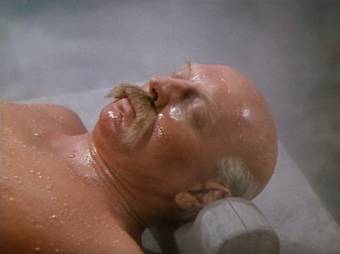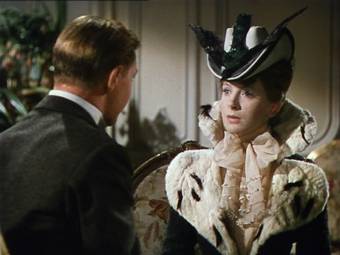|
If
I was lucky enough to have met Michael Powell and hear
first hand that his favourite P & P movie was A
Matter of Life and Death, then confirmation
of his creative partner's choice (The Life and
Death of Colonel Blimp) comes from the accompanying
documentary on the disc and is also contained in the pages
of part one of Powell's autobiography, 'A Life In Movies'.
It's not a surprising choice given that Pressburger was
an enthusiastic anglophile. The German character (Theo
Kretschmar-Schuldorff played by the incomparable Anton
Walbrook) is welcomed into the UK during the middle of
the second world war despite his soldiering against the
UK throughout his long career. Pressburger must have revelled
in writing this extraordinarily moving scene (Theo's wife
had died and his children became Nazis so with nothing
in Germany to keep him there, he sought refuge in the
UK). You wonder if Pressburger was taken into to his beloved
country in the same manner as his fictitious German character.
Blimp is a movie that encompasses many huge themes and is a
work that is not only ahead of its time, its panache and
élan is markedly ahead of many film-making styles
even being practised now, over sixty years later. In fact,
looking at the broader picture, Blimp is to modern cinema, as General Wynne-Candy (Blimp's movie
identity) is to the whippersnapper soldiers who regard
the old guard as old codgers, out of touch OAPs who have
nothing more to offer. The fact that Blimp is actually about many important themes and modern cinema
is about lightning flashes which very occasionally strike
and illuminate a subject of weight almost by accident,
is another aspect that underlines Blimp as a profound treatise on being human.
The
original cartoon character of Colonel Blimp was created
by David Low in the late 1800s. He was an intractable,
stuck-in-his-ways old soldier who actively discouraged
anything 'new fangled'. He represented a long since gone
'old guard', something decidedly unflattering to the Empire's
powers-that-were. The movie's Colonel Blimp is many cavalry
charges away from two dimensional. Roger Livesey's portrayal
is touching, gallant and full of unresolved longing. He's
the sort of soldier even a pacifist would admire with
eminently admirable traits. You could read Blimp as England
personified, but a romanticised England. His is the stiff
upper lip that twitches at wrongs and strives to right
them. He only ever trips up when a certain subtle emotional
response is required when it is clearly so far off his
radar, it may as well be in geostationary orbit around
Pluto. Wynne-Candy (Clive to you and me) is an emotional
baby. He knows absolute right from wrong and was brave
enough in the Boer war to earn a Victoria Cross but give
him a woman and he wouldn't know whether to pat it on
the head or throw a stick for her… Now this isn't
to be derogative. It's just that England Expects…
men not to know how to be with women…

People
grow old. They have opinions. Sometimes those opinions
change. Sometimes they don't. Being a German doesn't make
anyone a Nazi. Friendships between individuals can flourish
while their countries try to annihilate each other. Youngsters
cannot imagine what it is like to be encased in an older
body whereas the sadness is that the reverse is never
true. Colonel Clive Wynne-Candy is an old soldier lounging
is a steam bath. He is assaulted by brash, impudent soldiers
who have deliberately taken the directive that 'war starts
at midnight' and decided to play as dirty as the enemy
they are fighting. Nazis would not observe rules so these
men assume that's the way to win a war against Nazis (I
have to admit, the logic works for me) and within ten
minutes of screen time, the young commander is standing
in front of the old Clive as he sweats, making fun of
the heavier, older man. Big mistake.
In
one of the cinema's smartest flashback transitions (in
one take, mind you), the older Clive dives in to the pool
to beat some sense into the young commander and as the
camera passes over the pool, we see the young, dashing
Clive step out the other end. It's now 1902. It's one
of those shots that makes you link the term film-maker
with artist with no hesitation. Clive Candy is vibrant
and brash with youthful vigour (Livesey was 37 at the
time and straddles the demands of a role that take him
from his late twenties to his early sixties with great
aplomb). I am also thrilled to mention that Roger Livesey
– like myself – was a Welshman born not far from where
I was, in Barry, South Wales. That accent is very far
from Welsh.... We learn quickly that Clive Wynne-Candy
has a strong sense of morality and has already won a Victoria
Cross. To maintain a positive spin on how England is perceived,
Clive travels to Berlin to help an English teacher, Edith,
to staunch damaging propaganda. After a wonderful scene
in a Berlin restaurant, Candy gets himself into a duel
with a fellow soldier fighting to satisfy the German army's
honour. Recovering from their wounds, the German, Theo,
and Clive become firm friends and Theo and Edith fall
in love. It's in these scenes where the unfussy Roger
Livesey comes into his own (aided by a superb screenplay
of course).
Theo asks for a second duel believing that Clive and Edith
are romantically linked. He has fallen in love with her
and Clive, in shock, stands on his bed and looks down
at his friend. "You're cuckoo!" he says (this
in itself is a terrific reverse as it's really Clive who's
the cuckoo, or cuckold because he really is in love with
Edith too but he's too bloody English to know it yet.
Livesey's acting here is exemplary). But then he breaks
into a grin, steps off the bed and warmly congratulates
his friend. He seems to be OK until he moves in to kiss
Edith. As he moves away we see that Clive knows he has
just kissed goodbye any chance of romantic fulfilment.
He is utterly in love and he's just given away his sweetheart
to his best friend. His sense of self-deception locks
in but he cannot get Edith out of his mind and throughout
the next forty years, he finds women who resemble Edith
a great deal (casting wise, this is not surprising as
they are all played with a prim undercurrent of refined
sexuality by Deborah Kerr). When Clive learns that Theo's
been taken prisoner, he performs a lovely bit of what
actors call 'business'. "Poor old Theo," he
says and he strokes underneath his moustache which of
course was grown to hide his huge scar from a clean cut
given to him by Theo. It's subtle but it's tremendously
affecting.

Pressburger
may have reminded Powell that cinema is not words but
repeated exposure to Blimp means that
words that may have sailed over your head at the first
viewings now makes your jaw drop with the humour, the
signposting and the love of the language. Two examples
of this; the best friends have had their duel and both
been handsomely cut by each other's swords. They are nursed
by the woman whom Clive falls in love with but who eventually
leaves in love with Theo. Convalescence is dull so the
friends play Bridge endlessly. At the start of their games,
Candy shuffles the cards and says (and it still makes
me smile with the brilliance of it) "Cut for partners?"
Sublime. Secondly, with the use of three words five minutes
apart, Pressburger demonstrates the art of economy, a
screenwriter's principal weapon. In the middle of the
First World War, Clive, still in love with Edith, is offered
macaroni. "Beastly stuff!" he comments preferring
to visit the local convent to find better food. Minutes
inside the convent, Clive encounters the woman he will
marry, a nurse the spitting image of Edith. He is then
offered macaroni again and Clive offhandedly says "Splendid!"
That's how to write screenplays, folks.
These are merely two instances that convince me even more
that Pressburger's skill as a screenwriter was off the
chart. He seemed to know what Powell could do with his
words, how those elusive emotional attachments could form.
It's a creative form of prescience because most film-makers
have no clue what emotional effect their film is going
to have on an audience but Pressburger's command of his
words and faith in a director so suited to his partnership
seems to grasp what's possible. At the end of the film,
Clive acknowledges that new methods of warfare are necessary
after being caught with his trousers down in a war game,
one which neatly bookends Blimp. He is
distraught at his uselessness but then with wisdom, he
swallows his pride and agrees to invite the young impudent
soldier to dinner. There is a wonderfully moving but simple
pan from Clive's driver 'Johnny' (another Edith clone)
to Theo and to Clive, who finally accepts the new world
in with a resounding salute. How this could be moving
eliciting real warmth from this particular audience I
will never know. But P & P do. And it's a consistently
revealing joy to experience.
One
trivial aside: Clive Candy heads the Home Guard at the
end of Blimp and his batman and housekeeper
is played by John Laurie. Shortly before the Blitz, Laurie
announces he has joined the Home Guard. It's a lovely
nod to the actor (more prescience by Emeric & Mickey?)
as Laurie goes on to become famous as Private Fraser the
home guard undertaker in Dads' Army.
As
with the other two Technicolor classics, the sound is
clear with no showy effects from the mono to Dolby Digital
transfer.
The
picture quality is very good (although someone please
introduce P & P to drop shadow for their credits)
with extraordinarily few sparkles and hardly any evidence
of negative dirt. This DVD is essentially the same pressing
as the 2000 released DVD but that one was terrific too.
This time, we get a few extras.
Side
Note: In direct comparison with the Criterion
Collection DVD of Blimp (a DVD that slaughters
the HMV release in the areas of Extras – a Scorsese and
Michael Powell commentary? Wow!) I have an interesting
fact to report. The Criterion version proclaims a transfer
from the original full-length version held by the British
Film Institute. Something must have slipped by because
directly comparing the two versions, the Criterion does
have a slight pink overall tinge. It's very noticeable
when screened side by side and in light of Criterion's
usually high standards, this came as a bit of a blow.
Gallery
A 'Ken Burns Effect' trawl though a series of promotional
stills (frankly not that sharp) in B&W and colour. Nice
to see the promotional material featured.
Documentary (23'48")
With no title and called simply 'Documentary',
this is a retrospective from relatives' points of view and
nice to see fan Stephen Fry chipping in. It also gives a
political context for the film with offerings from P &
P champion, Ian Christie (the champion of P & P and
author of the sumptuous volume on P & P, Arrows of Desire).
Again, if you enjoyed the movie, this is a perfect dessert.
The only downside of these stand alone retrospectives is
their liberal use of clips. Once you've just seen the movie,
you really don't need the clips. A small gripe.
|